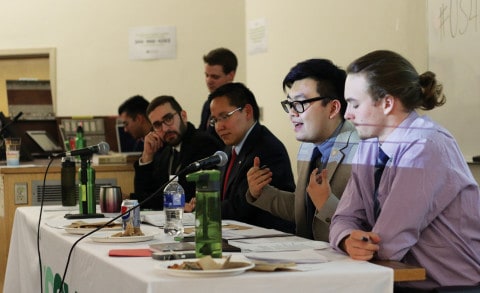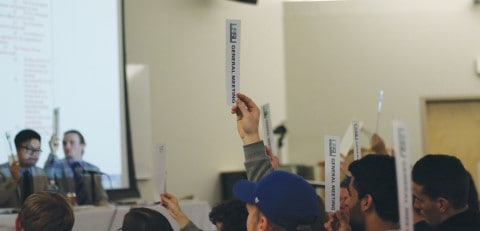With quorum met, the University of Saskatchewan Students’ Union sat down with students in the Neatby-Timlin Theatre on Nov. 26 to recap notable progress that has been made since the last Annual General Meeting and to address current student concerns and proposed amendments.
 Jack Saddleback, USSU president, opened the evening with a reading of the President’s Report which made note of several significant initiatives already in progress, followed up by the agenda for this year’s AGM, which included 18 official amendments.
Jack Saddleback, USSU president, opened the evening with a reading of the President’s Report which made note of several significant initiatives already in progress, followed up by the agenda for this year’s AGM, which included 18 official amendments.
Jeff Toppings, a member of the University Student Council representing the College of Engineering, proposed one amendment to the fourth section of bylaw 11 regarding the current quorum requirement.
“My feelings on this is that this number, currently 0.25 per cent of all students, is a number which is not representative of the whole student body,” Toppings said.
He proposed that quorum for a general meeting be changed from the original 50 students and 15 councillors to two per cent of the student population, and 15 councillors. That works out to just over 300 students in total, not including the members of student council.
Quorum is the number of students and councillors required for a meeting to move forward.
All undergraduate students are eligible to vote on proposed amendments to the USSU bylaws, which are reviewed by the USSU’s lawyer to ensure that the proposed amendments adhere to the spirit and intent of the bylaw.
Despite Toppings’ concerns, Gabe Senecal, USSU vice-president academic affairs, voiced his own concerns toward the proposed amendment.
“I definitely agree with the spirit of the motion, but it’s just a matter of feasibility. There are about 60 or 70 of us here tonight, and we’ve been promoting for a considerable amount of time, and it’s just not a possibility to get 300 or so students out here for an AGM. It’s been pretty consistent throughout the years, so there’s no reason to feel that it would easily fluctuate much,” Senecal said.
Kehan Fu, USSU vice-president student affairs, agreed with Senecal, though he expressed appreciation for Toppings’s democratic engagement.
“It’s important to note that the individuals here, that you guys are not the norm for students. You are the exceptions. And I’m not saying that you guys should be the exceptions. In a perfect world, students would be as engaged as possible. But there’s a lot of factors that play into engagement, but there’s a reason why the limitation exists as it is,” Fu said.
Although the amendment was defeated, the USSU extended an invitation to all of the student body about this matter and encourages students to share their ideas on how the USSU can continue to engage the campus community and increase attendance for future AGMs.
 The last notable amendment of the evening came later in the meeting and drew attention to the way in which the USSU executive carry out their election campaigns.
The last notable amendment of the evening came later in the meeting and drew attention to the way in which the USSU executive carry out their election campaigns.
U of S student Luke Brossard proposed an amendment to include a section in the USSU bylaws entitled “Slates and Candidate Alliances,” whereby “slate” is defined as any informal or formal collaboration between candidates for executive positions in which the goal is to increase the odds of the participants of becoming elected.
Saddleback speaks to the importance of this amendment to U of S culture.
“Slates do happen in student unions but slates are not necessarily something that the USSU has taken part in. There have been instances where slates have taken place but for the most part, our university culture is different and U of S students feel that it is important that slates are not necessarily something that should be enforced at an executive level,” Saddleback said.
Because Brossard was not in attendance, the USSU had to speculate what the intent was behind this amendment.
“Slates are not democratic in nature for the USSU’s election system and by having executives run as independent people, you are going to be able to get the cream of the crop,” Saddleback said.
This was Saddleback’s third year attending the AGM and he encourages students to consider the impact they can make on campus policies and democracy moving forward.
“This is your USSU, and you have the freedom to be able to change the USSU in whatever regard that you would like to see going forward. Partake in and propose amendments. It is not out of anyone’s realm to put forth an amendment, and if there are any questions that folks have, they can definitely contact any of the executive or the USSU to be able to help them if they would like to put forward an amendment.”
Leave a Reply